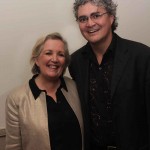
 I’ve been encouraged to write more on this topic after my previous post Dignity or pride in 2013. Here I show an image of celebrities Jane Caro being awarded the AHOY 2013 (Australian Humanist of the Year) by Robyn Williams (AHOY 1993) with me as the Convenor/MC of the CAHS (Council of Humanist Societies) Convention Dinner Sydney at which my son Paul Zagoridis was elected President of CAHS. Hence I’m using this example as a positive definition of pride considering that these images are mementos depicting how proud I was of the occasion and the people connected with it. So pride can be both positive and negative. Negative in the sense that it blinds us to the damage of ego. As in the case of not wanting to see the obvious such as when someone we love does not return that love. We only see that person as either popular, wealthy, good looking who will boost our status if seen to be partnered with us no matter what or we don’t want to believe someone we love does not love us as much as we wish – that is an example of negative pride. Or expecting our children to succeed in education, sport or career when it is causing them pain just so that we shine is a negative pride. However, if it is a pride as a result of supporting their dreams and achievements for their happiness then it is a justified pride.
I’ve been encouraged to write more on this topic after my previous post Dignity or pride in 2013. Here I show an image of celebrities Jane Caro being awarded the AHOY 2013 (Australian Humanist of the Year) by Robyn Williams (AHOY 1993) with me as the Convenor/MC of the CAHS (Council of Humanist Societies) Convention Dinner Sydney at which my son Paul Zagoridis was elected President of CAHS. Hence I’m using this example as a positive definition of pride considering that these images are mementos depicting how proud I was of the occasion and the people connected with it. So pride can be both positive and negative. Negative in the sense that it blinds us to the damage of ego. As in the case of not wanting to see the obvious such as when someone we love does not return that love. We only see that person as either popular, wealthy, good looking who will boost our status if seen to be partnered with us no matter what or we don’t want to believe someone we love does not love us as much as we wish – that is an example of negative pride. Or expecting our children to succeed in education, sport or career when it is causing them pain just so that we shine is a negative pride. However, if it is a pride as a result of supporting their dreams and achievements for their happiness then it is a justified pride.
Dignity:Â I don’t believe there is a negative dignity. The word itself implies a positivity. It comes with maturity, both age and emotional, even though it is encouraged that the ‘child within’ needs to be given the freedom to enjoy certain joys in life, being able to discern when, where, how and at what level shows a person’s self awareness and maturity.
Perhaps better than Dignity or Pride should be written Dignity and Pride for both may be needed at times.